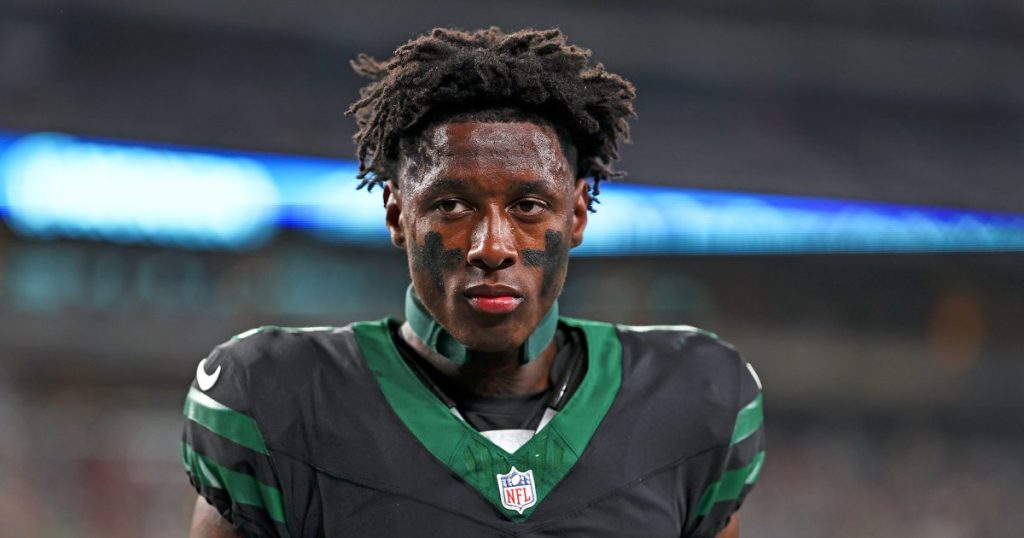The Genesis of the Online Feud and Ensuing Legal Battle
The controversy began in August 2024 with a seemingly innocuous post by New York Jets cornerback Sauce Gardner on X (formerly Twitter). Gardner, a rising star in the NFL, shared a picture of an empty room in his new house, hinting at plans for a new addition. Kalli Mariakis, a self-proclaimed Buffalo Bills fan, responded with a playful jab about Gardner’s on-field performance, suggesting he install a simulator to improve his pass coverage skills. This seemingly harmless exchange quickly escalated when Gardner retorted with a claim that Mariakis had sent him a direct message containing a link to her OnlyFans page, a platform primarily known for adult content. This accusation, which Mariakis vehemently denies, forms the crux of the lawsuit she filed against Gardner in Morris County, New Jersey Superior Court.
Mariakis’s Claims of Defamation and Harassment
Mariakis’s lawsuit centers on the assertion that Gardner’s statement about her having an OnlyFans account is "knowingly false and malicious." She contends that this false accusation has subjected her, her husband, and her daughter to significant online harassment and disparagement. Her Instagram account, for instance, has been flooded with comments referencing the incident, with users demanding the alleged OnlyFans link or making derogatory remarks. The lawsuit paints a picture of a family enduring unwarranted public scrutiny and ridicule due to Gardner’s allegedly fabricated claim. Mariakis’s legal action seeks compensatory and punitive damages for the emotional distress and reputational harm she alleges she has suffered.
Barstool Sports’s Involvement and the Scope of the Lawsuit
The lawsuit also names Barstool Sports, a prominent sports and pop culture media company, as a defendant. Following the online exchange between Gardner and Mariakis, Barstool published an article with a headline that seemed to validate Gardner’s claim. The article cautioned married OnlyFans models against trolling Gardner about his playing abilities, implicitly suggesting the veracity of his accusation against Mariakis. The lawsuit argues that this article not only amplified the false narrative but also intentionally perpetuated a falsehood that served to reinforce Gardner’s online persona as someone not to be trifled with. The inclusion of Barstool Sports in the lawsuit broadens the legal implications of the case, raising questions about media responsibility and the potential for online platforms to exacerbate reputational harm.
The Legal and Ethical Dimensions of Online Disputes
This case highlights the complex legal and ethical challenges arising from online disputes, particularly those involving public figures and potentially damaging accusations. The speed and virality of online communication can amplify the impact of false statements, leading to widespread reputational damage and emotional distress. The lawsuit raises crucial questions about the responsibility of individuals and media outlets to verify information before disseminating it online. Furthermore, it underscores the potential for online platforms to become breeding grounds for harassment and cyberbullying, especially when fueled by unsubstantiated claims made by individuals with large followings.
The Impact on Gardner’s Career and Public Image
For Sauce Gardner, this lawsuit presents a significant challenge to his burgeoning NFL career and public image. Drafted fourth overall by the Jets in 2022 and signed to a lucrative four-year contract, Gardner has quickly established himself as a promising young talent. However, this lawsuit threatens to overshadow his on-field accomplishments and cast a negative light on his character. The outcome of the legal proceedings could have lasting implications for his public perception and future endorsements. The case serves as a stark reminder that even seemingly trivial online exchanges can have serious real-world consequences, particularly for individuals in the public eye.
The Broader Implications for Online Discourse and Accountability
The Gardner-Mariakis lawsuit underscores the need for greater accountability in online discourse. In an era of rapid information dissemination and viral trends, the potential for false or misleading information to cause significant harm is amplified. This case highlights the importance of verifying information before sharing it online, particularly when it involves accusations that could damage someone’s reputation. It also raises questions about the role of media outlets in amplifying such narratives and the need for more responsible reporting practices. The outcome of this case could have far-reaching implications for how online disputes are handled and could contribute to shaping future legal precedents regarding defamation and online harassment in the digital age.


